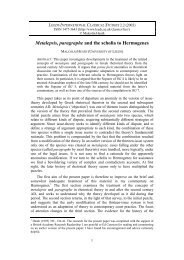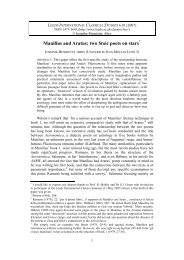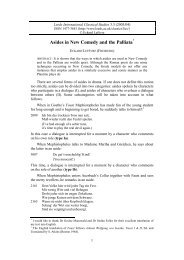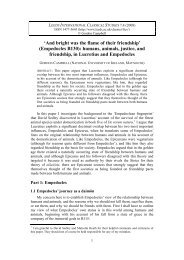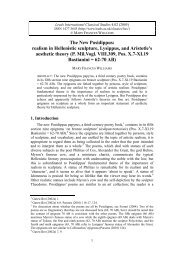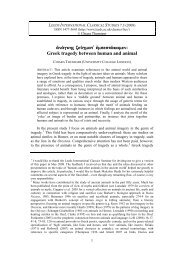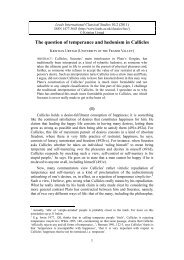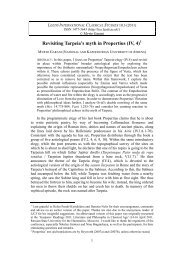Teiresias, the seer of Oedipus the King - Leeds International ...
Teiresias, the seer of Oedipus the King - Leeds International ...
Teiresias, the seer of Oedipus the King - Leeds International ...
Create successful ePaper yourself
Turn your PDF publications into a flip-book with our unique Google optimized e-Paper software.
3. Conclusion<br />
HANNA M. ROISMAN, TEIRESIAS, THE SEER OF OEDIPUS THE KING<br />
I would like to close <strong>the</strong> paper with some thoughts about <strong>the</strong> philosophical<br />
implications <strong>of</strong> <strong>the</strong> revelations <strong>of</strong> <strong>the</strong> two <strong>Teiresias</strong>es. The revelations <strong>of</strong> Seneca’s<br />
<strong>Teiresias</strong> are as opaque and incremental as those <strong>of</strong> Sophocles’ <strong>seer</strong>, and even less<br />
informative. This does not arouse <strong>the</strong> consternation it had in Sophocles’ play,<br />
however. Any possible annoyance, whe<strong>the</strong>r on <strong>the</strong> part <strong>of</strong> <strong>the</strong> inner or outer<br />
audience, is deflected in advance by <strong>the</strong> depiction <strong>of</strong> <strong>Teiresias</strong>’ good will, his<br />
frank if ra<strong>the</strong>r un<strong>seer</strong>like admissions <strong>of</strong> confusion, and his shifting <strong>the</strong><br />
responsibility for his failure to provide a clear answer to <strong>the</strong> gods, whom he<br />
describes as angry, ambivalent, and veiling <strong>the</strong>ir messages. Seneca’s <strong>Oedipus</strong>, for<br />
his part, expects less <strong>of</strong> <strong>Teiresias</strong> than <strong>the</strong> Sophoclean king. While Sophocles’<br />
<strong>Oedipus</strong> had explicitly asked <strong>the</strong> <strong>seer</strong> to reveal <strong>the</strong> name <strong>of</strong> <strong>the</strong> murderer, Seneca’s<br />
<strong>Oedipus</strong> asks him only to ‘expound <strong>the</strong> responses’ (responsa solve, 292)—that is,<br />
to perform a divination and explain <strong>the</strong> meaning <strong>of</strong> <strong>the</strong> signs. This is a more<br />
modest request, which does not set up <strong>the</strong> expectation, as Sophocles had, that<br />
<strong>Teiresias</strong> possesses complete knowledge, which he can share.<br />
This difference in <strong>the</strong> expectations inherent in <strong>the</strong> two plays is related to a<br />
fundamental difference in <strong>the</strong>ir attitudes toward <strong>the</strong> gods. Sophocles is concerned<br />
about <strong>the</strong> injustice <strong>of</strong> <strong>Oedipus</strong>’ fate. His depiction <strong>of</strong> <strong>Teiresias</strong>, who may be<br />
viewed as a representative <strong>of</strong> <strong>the</strong> gods, as gallingly irritating and intent on<br />
separating knowledge from revelation, seems to be an expression <strong>of</strong> protest<br />
against <strong>the</strong> cruelty <strong>of</strong> <strong>the</strong> gods, who <strong>the</strong> play repeatedly states forged <strong>Oedipus</strong>’<br />
unavoidable destiny. There is no such protest in Seneca’s play. In <strong>Teiresias</strong>’<br />
interpretations in <strong>the</strong> divination scene, <strong>the</strong> gods come across as confused and<br />
ambivalent. <strong>Oedipus</strong>, for his part, has premonitions <strong>of</strong> guilt from <strong>the</strong> very<br />
beginning <strong>of</strong> <strong>the</strong> play, and so takes upon himself complete responsibility for his<br />
actions. All in all, Sophocles’ <strong>Teiresias</strong> is a fitting <strong>seer</strong> for <strong>the</strong> deeply pessimistic<br />
world-view <strong>of</strong> <strong>the</strong> play, while Seneca’s <strong>Teiresias</strong> is <strong>the</strong> right <strong>seer</strong> for that play’s<br />
more resigned and accepting attitude.<br />
Bibliography<br />
Ahl, F. (1991) Sophocles’ <strong>Oedipus</strong>: Evidence and Self-Conviction (Ithaca and<br />
London: Cornell University Press)<br />
Bain, D. (1979) ‘A Misunderstood Scene in Sophokles’ Oidipous (O.T. 300-462)’,<br />
G&R 26, 132-45<br />
Bishop, J.D. (1978) ‘Seneca’s <strong>Oedipus</strong>: Opposition Literature’, CJ 73, 289-301<br />
Bloom, H. (1988) ed., Sophocles’ <strong>Oedipus</strong> Rex (New York, New Haven,<br />
Philadelphia: Chelsea House Publishers)<br />
Boyle, A.J. (1977) Tragic Seneca: An Essay in <strong>the</strong> Theatrical Tradition (London<br />
and New York: Routledge)<br />
Champlin, M.W. (1969) ‘<strong>Oedipus</strong> Tyrannus and <strong>the</strong> Problem <strong>of</strong> Knowledge’, CJ<br />
64, 337-45<br />
18



